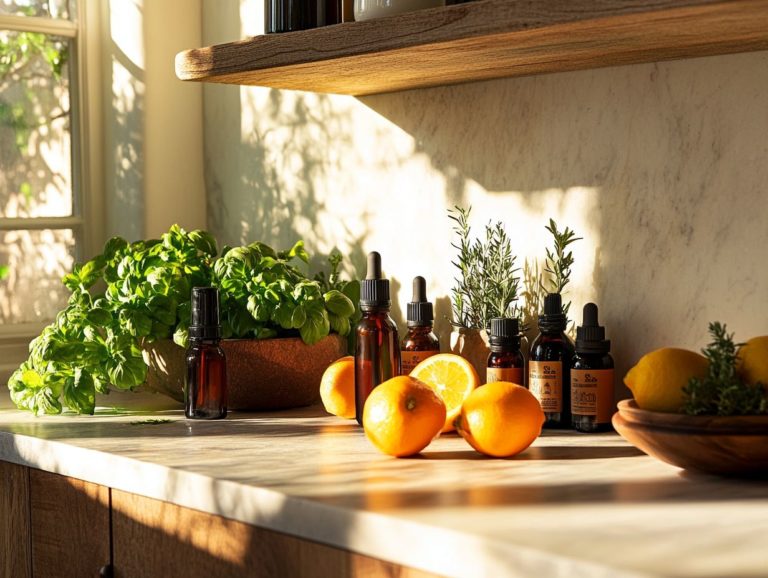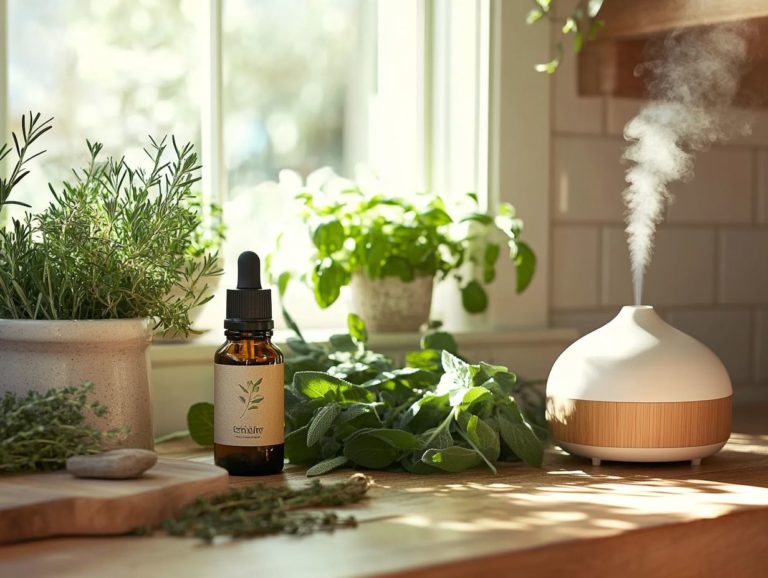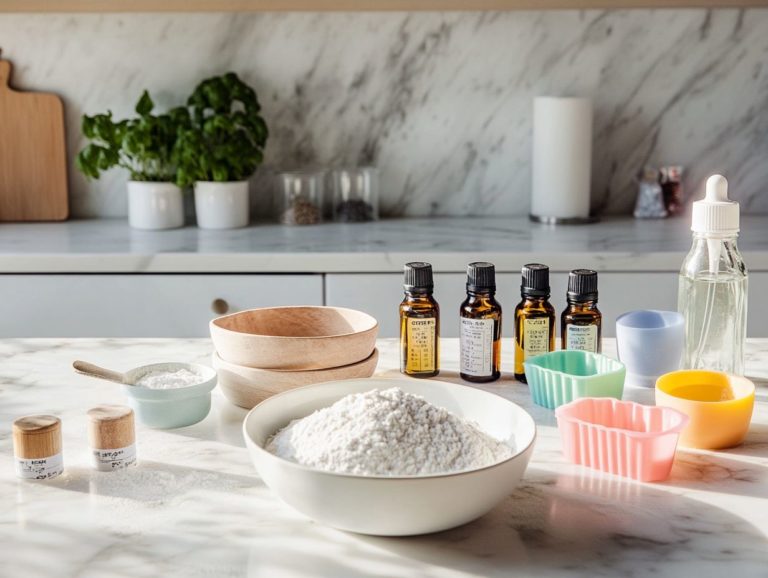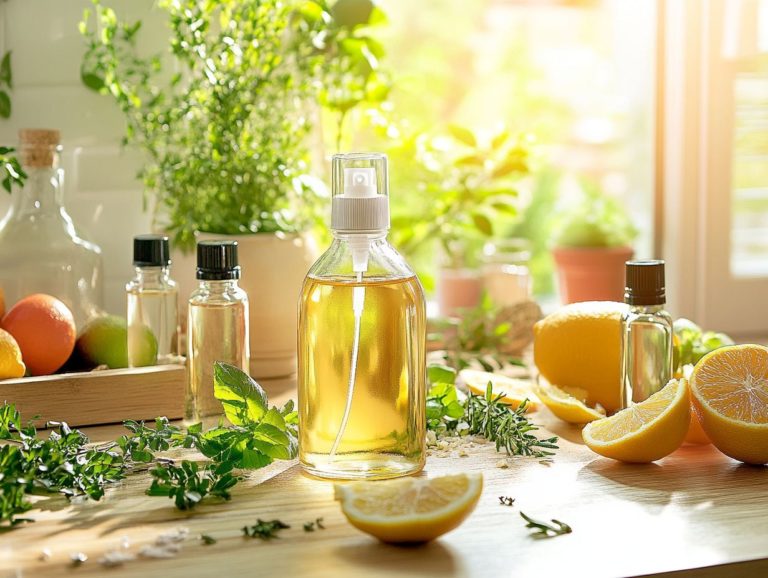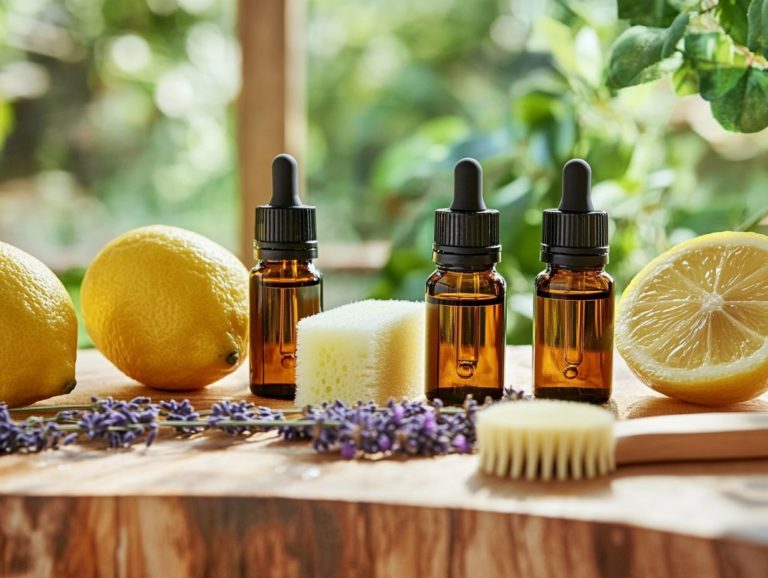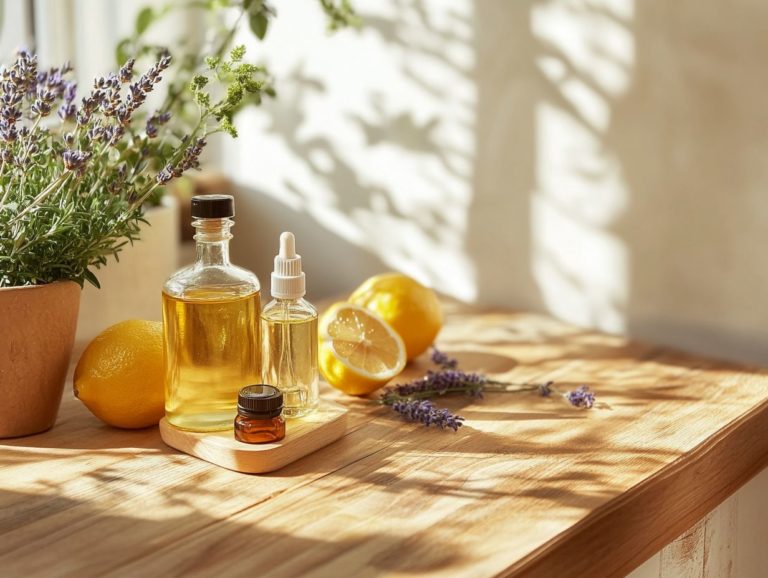How to Safely Store Essential Oils for Cleaning
Essential oils transcend mere pleasant aromas; they embody powerful cleaning properties that can make your home fresher and healthier. They offer numerous health benefits as well.
This article delves into the many benefits of utilizing essential oils for cleaning. It also highlights the top oils that deliver exceptional effectiveness and mood-enhancing qualities.
It also offers tips on how to store essential oils properly to keep them effective and safe. By taking the right precautions, you can harness the natural cleaning prowess of essential oils while ensuring a safe environment for everyone in your home.
Contents
- Key Takeaways:
- What Are Essential Oils?
- Why Use Essential Oils for Cleaning?
- What Are the Best Essential Oils for Cleaning?
- How to Properly Store Essential Oils for Cleaning?
- What Are the Safety Precautions When Using Essential Oils for Cleaning?
- What Are the Safety Precautions When Using Essential Oils for Cleaning?
- Frequently Asked Questions
- How should I store my essential oils for cleaning?
- Can I store my essential oils in plastic containers?
- What is the best way to organize my essential oils for cleaning?
- How long can I store essential oils for cleaning?
- Should I keep my essential oils out of reach of children?
- What precautions should I take when storing essential oils for cleaning?
Key Takeaways:
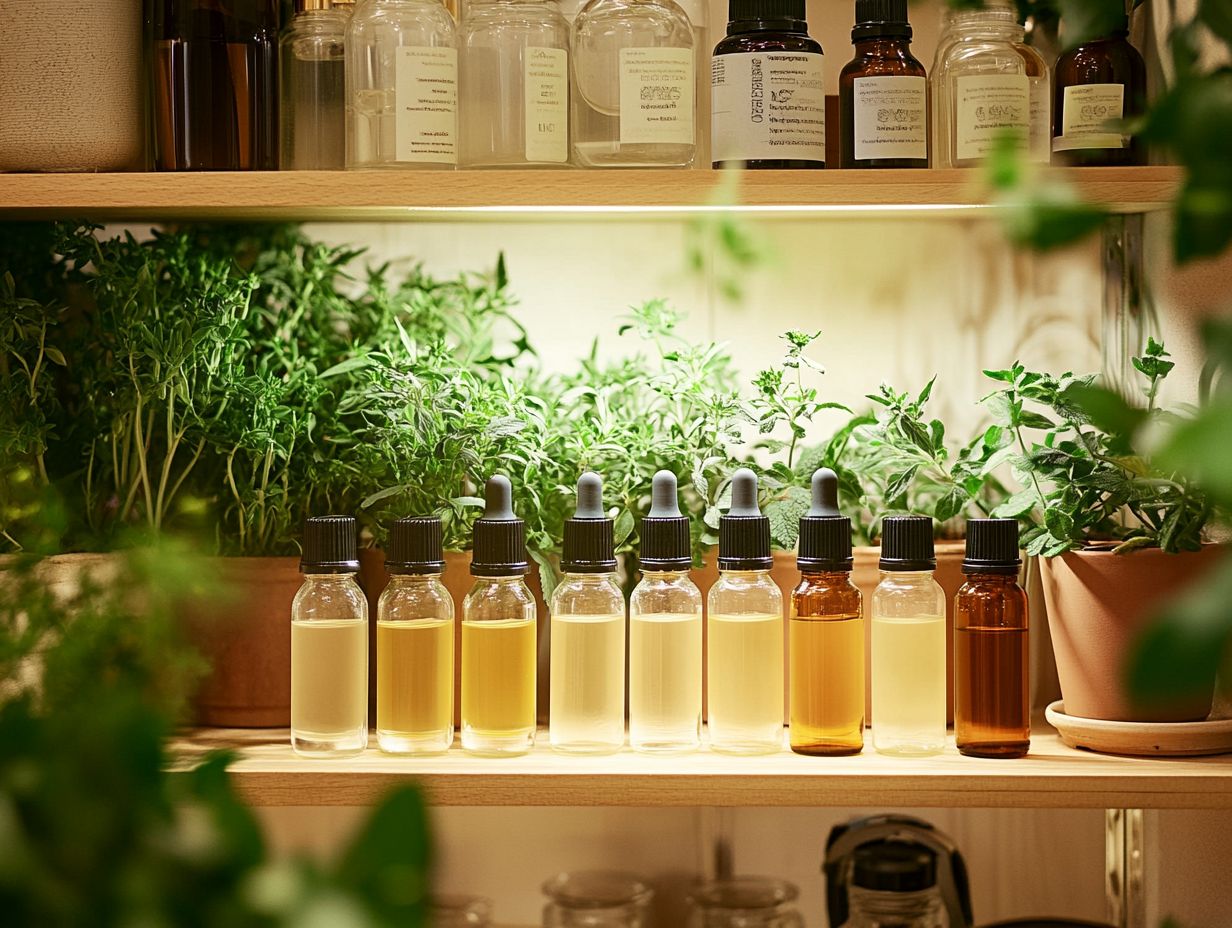
- Use dark glass bottles to store essential oils for cleaning to maintain their quality and effectiveness.
- Keep oils in a cool, dry place and out of reach of children and pets, as some oils can be toxic to pets.
- Dilute oils properly with a carrier oil, which is a neutral oil used to lessen the strength of essential oils, and avoid contact with eyes and skin.
What Are Essential Oils?
Essential oils are concentrated extracts sourced from an array of plants, including flowers, leaves, and roots, each encapsulating the aromatic essence and health benefits unique to its origin. Some popular essential oils include lavender, eucalyptus, and tea tree.
Typically extracted through methods such as steam distillation and cold pressing, these oils serve a multitude of purposes, from enhancing your aromatherapy experience to crafting your own cleaning solutions and DIY cleaners.
Renowned essential oil brands like Aura Cacia and Now offer premium-quality oils that you can find at health food stores, making it easy for you to explore the many benefits these natural solutions provide. Popular brands also include Pure Essences and Amazon.
Why Use Essential Oils for Cleaning?
Utilizing essential oils for cleaning presents a sophisticated alternative to conventional cleaning products. They offer a multitude of benefits that enhance your cleaning routine. With their antibacterial properties, delightful fragrances, and mood-enhancing qualities, oils like lavender, eucalyptus, and tea tree can be seamlessly integrated into your DIY cleaning solutions.
This approach not only keeps your home fresh but also ensures a sanctuary free from toxic chemicals. Moreover, many essential oils are pet-safe, allowing you to cultivate a healthy environment for both your family and your beloved furry companions. Always refer to safety information to ensure proper use.
What Are the Best Essential Oils for Cleaning?
In your quest to craft effective cleaning solutions, certain essential oils truly shine with their remarkable properties and benefits. For instance, lemon essential oil is renowned for its invigorating scent and natural disinfectant abilities, making it a go-to choice in your cleaning arsenal. Citrus oils like lemon and orange are particularly effective.
Tea tree oil, on the other hand, is revered for its powerful antibacterial properties, ensuring a thorough clean. You might also consider the delightful fragrances of lavender and eucalyptus, which not only elevate the ambiance but also create a clean and refreshing atmosphere, perfect for a variety of cleaning applications. Essential oil blends can be tailored for specific cleaning tasks.
When selecting your essential oils, look to esteemed brands like Pure Essences and Aura Cacia, which offer high-quality options that you can trust. Essential oil research supports their effectiveness in various applications.
1. Lemon Essential Oil
Lemon essential oil is your go-to natural cleaner, renowned for its invigorating scent and remarkable antibacterial properties. This makes it a highly sought-after choice for your DIY cleaning solutions.
Not only does it disinfect surfaces, but it also leaves behind a delightful aroma that can elevate your mood and foster a pristine atmosphere in your home. Lemon oil’s top notes contribute to its refreshing and uplifting qualities.
This versatile oil tackles grease and grime. You can add it to your all-purpose cleaners or use it in a homemade glass cleaner. To tap into its cleaning prowess, simply mix a few drops of lemon essential oil with water and white vinegar in a spray bottle, creating an effective surface disinfectant. You can even use it in your laundry routine to brighten whites and infuse a burst of freshness into your fabrics.
For an aromatic touch, consider crafting lemon-scented wipes by soaking reusable cloths in a mixture of lemon oil and vinegar. This not only offers convenience but also champions eco-friendliness. As a natural deodorizer, lemon essential oil can be added to a diffuser, cleansing the air while enhancing the ambiance of any space you inhabit.
2. Tea Tree Essential Oil
Tea tree essential oil stands out for its remarkable antibacterial properties, making it a critical component in your natural cleaning arsenal. This versatile oil is adept at battling mold and bacteria, which is particularly important in kitchens and bathrooms where hygiene is essential. Essential oil uses for tea tree oil include disinfectants and cleaning sprays.
Its capacity to inhibit the growth of harmful microorganisms has made it a top choice for eco-conscious households like yours, seeking effective and safe alternatives to conventional chemical cleaners. When you add a few drops to your cleaning solutions, you boost the cleaning power of vinegar or baking soda, creating a dynamic duo that deodorizes and sanitizes surfaces with ease.
You can also add tea tree essential oil into your homemade laundry detergents; it not only imparts a refreshing scent but also offers a natural method to eradicate germs from your fabrics. For those aiming to uphold a germ-free environment, mixing this essential oil with water in spray bottles allows you to craft a multipurpose cleaner that s perfect for countertops, doorknobs, and beyond. Among essential oil combinations, tea tree and lavender create a potent disinfectant blend.
3. Lavender Essential Oil
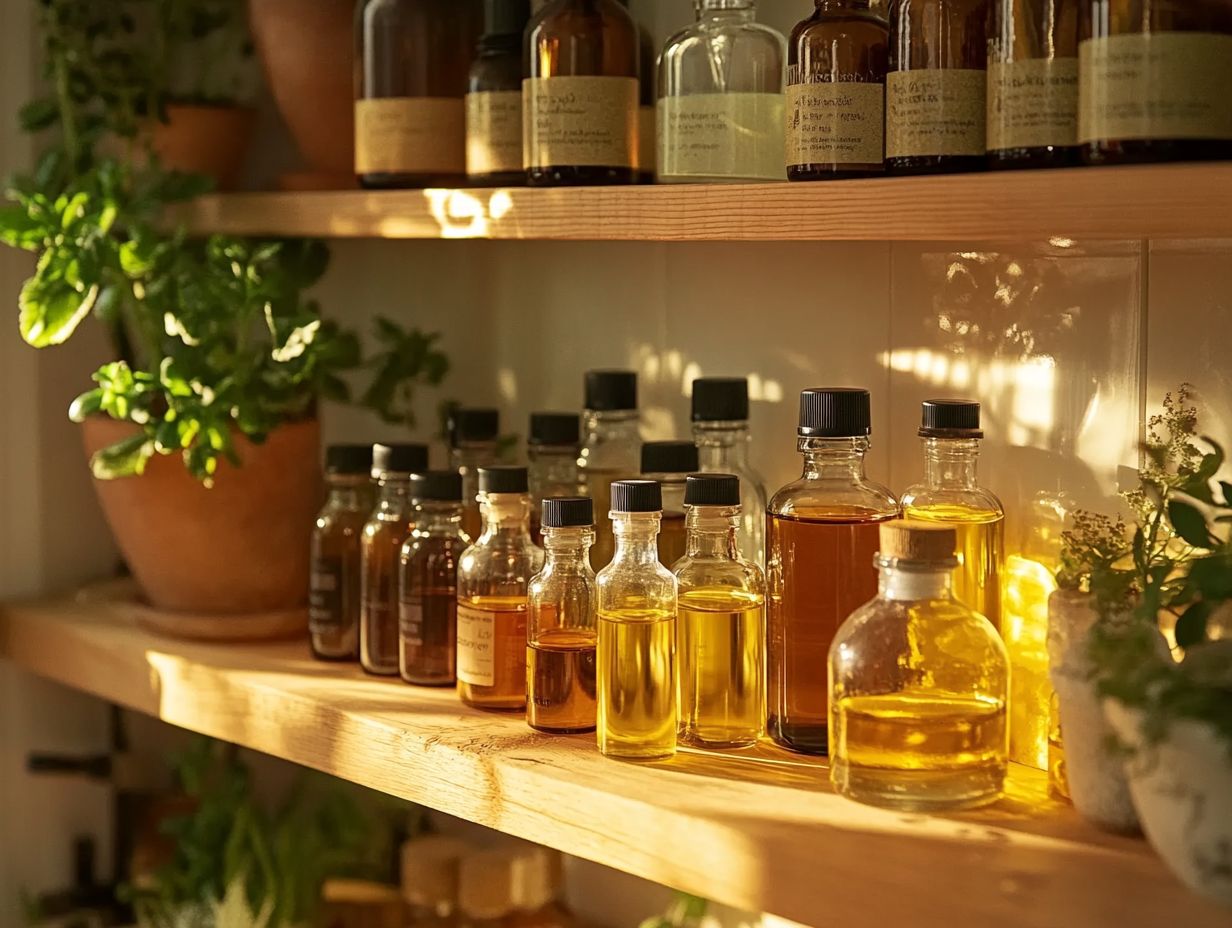
Lavender essential oil is more than just a beloved scent; it s a great natural cleaner that can brighten up any space. Its calming aroma not only uplifts your mood but also reduces stress, making it ideal for cleaning, particularly in places where relaxation is paramount, such as bedrooms and living rooms. Lavender oil pairs well with other essential oils for a balanced and effective cleaning blend.
The versatility of lavender essential oil goes beyond its enchanting fragrance; it boasts natural antibacterial properties that effectively eliminate harmful germs and bacteria from surfaces. When you add it to your cleaning products, this oil works to purify while leaving a refreshing scent that lingers in the air, fostering a sense of tranquility.
With its soothing properties, lavender can create a peaceful environment, perfect for unwinding after a long day. Whether you use it in homemade sprays, add it to your laundry, or diffuse it throughout your home while tidying up, lavender essential oil not only enhances cleanliness but also creates a welcoming atmosphere that makes your cleaning routine more enjoyable. Lavender oil’s bottom notes contribute to its long-lasting soothing effect.
4. Peppermint Essential Oil
Peppermint essential oil is celebrated for its invigorating scent. It often finds a place in cleaning products thanks to its natural antibacterial properties. Its refreshing aroma does more than just cleanse surfaces; it elevates your mood, transforming your home into a vibrant and energetic oasis. Peppermint oil is a favorite in essential oil therapy for its aromatic punch.
The benefits of peppermint extend beyond its delightful fragrance. It serves as a powerful grease cutter and effectively combats mildew, making it a critical ally in your quest to tackle stubborn stains.
When you incorporate this essential oil into a homemade cleaning solution, you replace harsh chemicals with a safer alternative, creating a healthier environment especially crucial for households with children or pets. Peppermint oil recipes for cleaners are simple and effective.
The crisp scent of peppermint neutralizes unpleasant odors, leaving your spaces smelling fresh and inviting. Many enthusiasts find that a few drops in a diffuser enhance the entire cleaning experience. This ensures that not only are your surfaces sparkling clean, but the very air you breathe feels revitalized.
How to Properly Store Essential Oils for Cleaning?
Storing essential oils correctly is vital for preserving their potency and effectiveness, particularly when they re used for cleaning. To maximize their longevity, keep essential oils in dark glass bottles, away from heat and light, and in a cool, dry place. Proper storage helps you enjoy their benefits for longer.
This approach prevents degradation and maintains the quality of the oils, ensuring you can fully enjoy their myriad benefits for an extended period.
1. Keep Away from Heat and Light
You should always keep essential oils away from heat and light. Both can lead to degradation and a loss of their valuable properties.
Storing them in a stable environment protects their potency and ensures they remain effective for your cleaning needs. When exposed to heat, the delicate natural ingredients in essential oils can evaporate or change, resulting in diminished aroma and therapeutic effects.
Light especially UV rays can also catalyze the breakdown of their constituents, leading to a loss of fragrance and viability. Storing oils properly is key to keeping them fresh and effective.
For those who depend on these oils for holistic practices or natural remedies, maintaining their integrity is essential. By using dark glass containers and placing them in cool, dark spaces, you can safeguard your essential oils and fully enjoy their myriad benefits, from uplifting scents to potent antibacterial properties.
2. Use Dark Glass Bottles
Using dark glass bottles to store your essential oils is crucial. They shield the oils from sunlight, which can compromise their quality over time. This approach ensures that your essential oils maintain their aromatic and therapeutic properties, providing you with an optimal experience.
Proper storage helps preserve the key scents of each oil. Dark glass bottles serve as a protective barrier against heat and oxygen, both of which can diminish the potency of the oils.
By minimizing these detrimental factors, you can look forward to an extended shelf life for your oils. This allows you to enjoy their full benefits and delightful aroma for a longer period.
The UV-filtering capabilities of dark glass are instrumental in preserving the integrity of the natural compounds found in essential oils. Enjoy their delightful scents and health benefits without worry.
Investing in high-quality storage solutions like these bottles not only safeguards your oils but also elevates your overall experience with them. Don’t miss out on the full benefits of your oils! Store them right!
Start organizing your essential oils today for the best cleaning experience!
3. Keep in a Cool, Dry Place
Store your essential oils in a cool, dry place. Humidity and heat can ruin their effectiveness.
Keep these precious oils away from direct sunlight and heat sources. Exposure breaks down their delicate compounds.
Essential oils are celebrated for their aromatic and therapeutic properties. Protect them from environmental changes to maintain their quality.
By maintaining a stable climate, you extend their shelf life and enjoy their intended benefits. This is especially true for aromatherapy and DIY cleaning solutions.
Proper storage helps preserve their antibacterial and antiseptic properties.
4. Store in a Safe Location
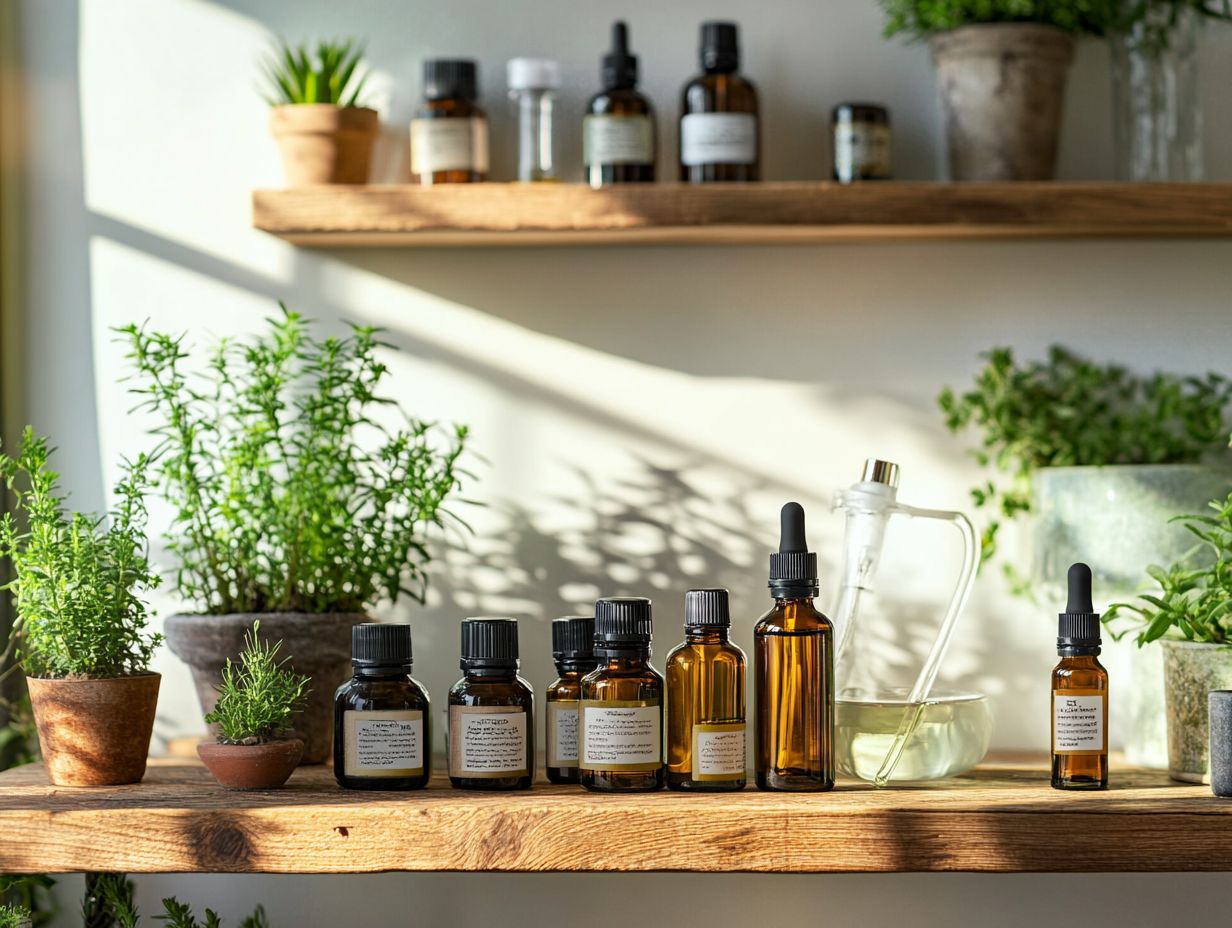
Storing essential oils securely is crucial if you have children or pets. Keep these potent substances out of reach for safety while ensuring convenient access for cleaning tasks.
Remember, even tiny amounts can pose risks due to their concentrated nature. Use child-proof locks on cabinets or designate specific shelves to reduce accidental exposure.
Label your bottles clearly and keep them in original packaging. This makes identification easier and enhances safety.
What Are the Safety Precautions When Using Essential Oils for Cleaning?
Using essential oils can elevate your cleaning routine, but safety is key. These highly concentrated oils require proper dilution and should be kept away from children and pets.
Popular oils like lavender, eucalyptus, and tea tree boast great antibacterial properties. Avoid direct contact with your eyes, skin, and never ingest them.
Transform your cleaning into a delightful, aromatic experience. Be sure to choose pet-safe oils and follow safety guidelines from reliable sources.
1. Dilute the Oils Properly
Properly diluting essential oils ensures safe use, especially in cleaning solutions. Using them undiluted can lead to skin irritation.
Follow recommended dilution ratios for a safe and effective cleaning experience. Brands like Aura Cacia and Now offer useful guidelines.
When using essential oils, consider their type and purpose. Oils like tea tree and lavender not only smell great but also have antibacterial benefits.
For topical applications, use a carrier oil, such as coconut or olive oil. For cleaning, a mix of water and vinegar can effectively dilute essential oils.
By adhering to these guidelines, you embrace the benefits of nature while avoiding risks. Look for recipes and information from trusted sources like Melissa Maker or Amazon.
2. Avoid Contact with Eyes and Skin
It is essential for you to avoid contact with your eyes and skin when using essential oils, as they can lead to irritation or allergic reactions. By being mindful of where and how you apply these oils, you can ensure a safer cleaning process and minimize the risk of discomfort. Essential oils like ginger, rosemary, and chamomile can be potent and should be handled with care.
The ingredients in these oils can be quite potent, potentially resulting in burns or rashes if they come into direct contact with sensitive areas. This precaution is especially crucial for anyone with skin sensitivities or allergies.
Understanding the top notes and bottom notes of each oil can help you use them more effectively and safely.
Should essential oils accidentally find their way into your eyes, the pain and vision disturbances can be significant. To manage these risks effectively, always dilute oils with a carrier before applying them to your skin, and consider using protective eyewear or face masks when handling concentrated forms. This is especially important when working with strong oils like peppermint oil or citrus oils.
It s also wise to keep these oils out of reach of children and pets, as they can unknowingly cause harm. Look for pet-safe oils to ensure the safety of your furry friends.
3. Do Not Ingest Essential Oils
Never ingest essential oils! They can be highly toxic due to their high concentration and potential toxicity. By using them as intended primarily for cleaning and aromatic purposes you can protect yourself from unnecessary health risks. Essential oils can be used as air fresheners or in other non-ingestible applications to enjoy their benefits safely.
The allure of essential oils may tempt you to consider them for internal use, but this can be dangerous, especially if you don’t adhere to proper dosages. Many essential oils contain compounds that can lead to negative effects, such as nausea, dizziness, or even more severe gastrointestinal issues when consumed incorrectly. Without a solid understanding of how each oil interacts with your body, you risk facing harmful side effects. Reliable sources and professional guidance are critical for safe usage.
It s crucial for you to consult reliable sources or seek professional guidance to grasp the safe practices surrounding these potent oils. This way, you can enjoy their benefits without putting your health in jeopardy. Modern essential oil research continues to uncover new safe practices and uses.
4. Keep Out of Reach of Children and Pets
To ensure your safety when using essential oils, it s essential to keep them out of reach of children and pets. While these oils offer remarkable benefits for cleaning, they can also pose health risks if accidentally ingested or misused by curious little hands and paws.
The vibrant colors and enticing aromas of essential oils can easily allure young children and pets, leading to unintended ingestion or contact that could result in allergic reactions or toxicity. Therefore, it is crucial to store these precious substances in secure containers and high cabinets, well beyond the reach of those inquisitive fingers and paws.
Consider using childproof locks on cabinets or drawers to further bolster safety measures in homes where these oils are present.
Take action now to keep these oils safely stored away! By practicing proper storage, you not only protect your loved ones but also promote responsible use, allowing you to enjoy the benefits of essential oils safely in your home.
What Are the Safety Precautions When Using Essential Oils for Cleaning?
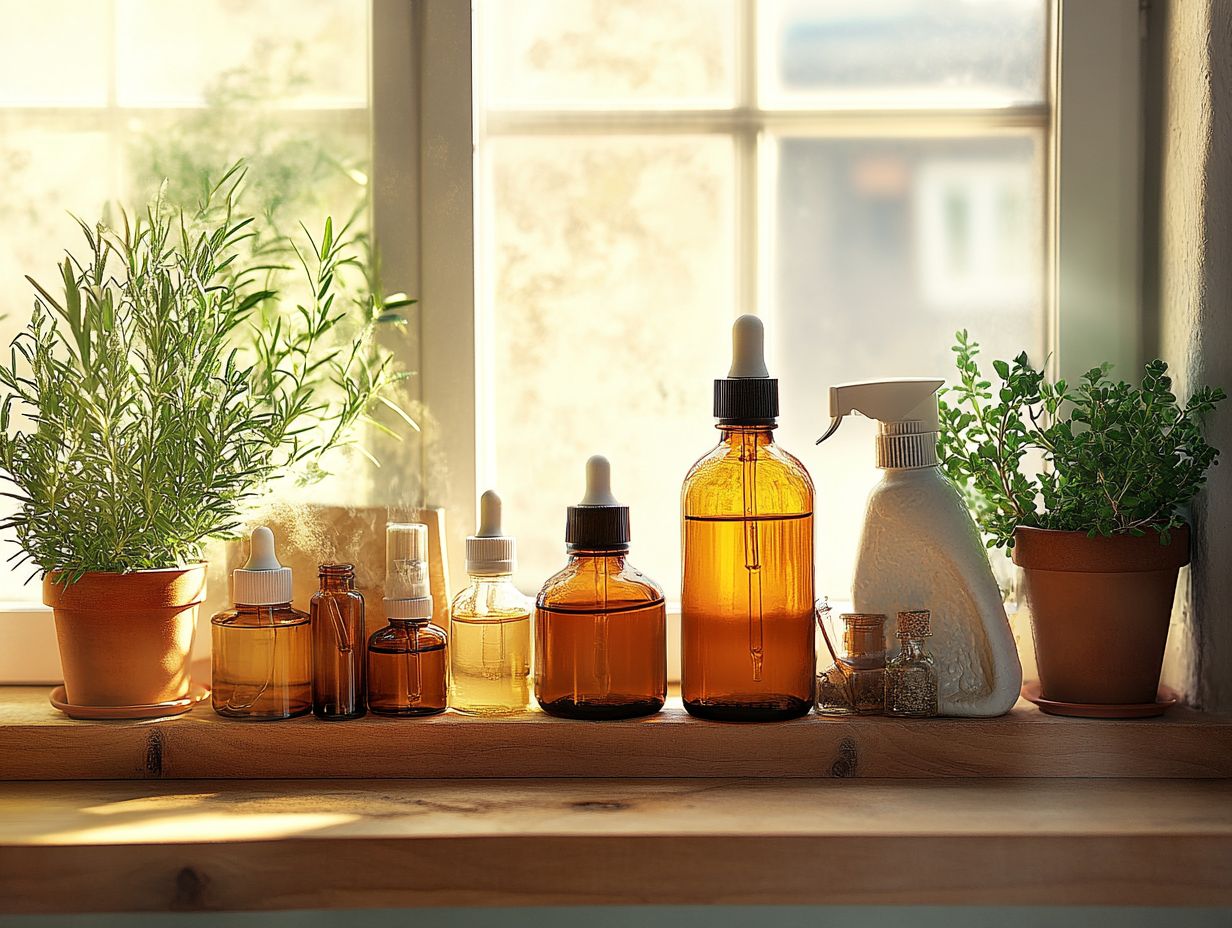
Incorporating essential oils into your cleaning routine is a wonderful way to elevate your space, but it s crucial to prioritize safety precautions to enjoy their benefits safely. These oils are highly concentrated and demand proper dilution before use, so keep them securely out of reach of children and pets. Essential oil therapy can offer numerous benefits when used correctly.
Frequently Asked Questions
Here are some common questions about using essential oils safely:
How should I store my essential oils for cleaning?
Store your essential oils in a cool, dark place, away from direct sunlight and heat. This helps keep them effective and prevents breakdown.
Can I store my essential oils in plastic containers?
No, avoid plastic containers. They can break down and contaminate the oils. Use glass or metal containers instead.
What is the best way to organize my essential oils for cleaning?
Organize your essential oils by type or purpose. Label them and use a storage box or tray to keep everything together. You can arrange them by scent notes for quicker access.
How long can I store essential oils for cleaning?
Essential oils can last a long time, but their effectiveness may drop after 1-2 years. Use them within this timeframe for the best results.
Should I keep my essential oils out of reach of children?
Yes, always keep essential oils out of reach of children and pets. They can be harmful if ingested or used incorrectly.
What precautions should I take when storing essential oils for cleaning?
Keep lids tightly closed and avoid exposure to extreme temperatures or moisture. Check expiration dates and dispose of any expired oils properly.

